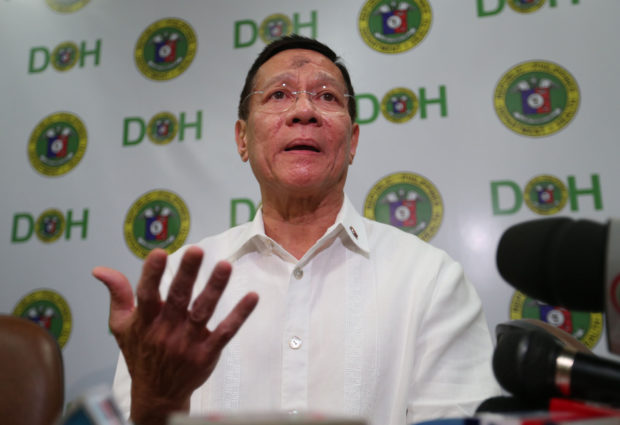The Department of Health (DOH) on Monday said it would file a case against Sanofi Pasteur after the French pharmaceutical giant again turned down the demand of the Philippine government that it fully refund the P3.5 billion paid for its dengue vaccine Dengvaxia, and to put up an indemnification fund for vaccinated children who would come down ill.
“The Office of the Secretary received the letter from Sanofi this morning saying that they are declining our request for a refund of the used vaccines and the setting up of indemnification fund,” Health Undersecretary Eric Domingo said in an interview with reporters.
“The Secretary (Francisco Duque III) was very unhappy … [We had wanted to settle this through negotiation] but this will leave us with no recourse but to file a case,” he said.
“Our legal office and the Office of Solicitor General are going to work together so that we can strengthen our case and file a case against Sanofi,” he added.
In a statement sent to reporters, Sanofi said “as we did in our previous reply to the DOH on [Feb. 5], 2018, we respectfully declined both requests.”
The company said it stood firmly behind its product.
Not ineffective
“We stand firmly behind our product. Refunding the used doses of Dengvaxia would imply that the vaccine is ineffective, which is not the case. And at this time, there is also no known circumstance requiring indemnification,” it said.
The DOH halted a mass immunization program last Dec. 1 after Sanofi announced the results of new analysis that showed Dengvaxia worsened symptoms in vaccinated people who had no previous exposure to the dengue virus.
More than 830,000 schoolchildren had been vaccinated by the time the program was stopped.
Several children were taken ill and the DOH had recorded 29 deaths. No death, however, has been found to have been caused by Dengvaxia.
Sanofi last month reimbursed the DOH P1.16 billion for unused Dengvaxia doses but said agreeing to the DOH’s demand did not mean its vaccine had a quality or safety problem.
But Duque had said a full refund was meritorious, as the “purported or reported or claimed protection of Dengvaxia wasn’t felt and wasn’t there.”
Domingo said the DOH was looking at initially filing a civil case against Sanofi.
“Initially, it will be a civil case on the basis that what they really sold us was a defective product. It’s not the product that they promised it to be… we believe they really are at fault here,” Domingo said.
“And of course, if we find any further evidence, it might lead to a criminal case because we believe there have been some misrepresentation on the side of Sanofi,” he added.
Contract under review
According to Domingo, the DOH legal team is reviewing its contract with Sanofi.
“Our legal team is now looking [at] the contract, specifically … what they promised the product to be. And we feel that we have a good case against them,” he said.
“Their product is really defective. They sold it to us saying it’s going to be good for everybody, that they can use it for all children. And after two years they tell us that it’s not. So there’s an inherent problem in the product that they sold us,” Domingo said.
“They said they never promised 100 percent effectivity … but the reason we’re returning it [is] … they sold it to us saying that it’s good and it [could] be used for everybody. And now they tell us there is a subset of children, the seronegative children who never had dengue before the vaccination that could be put at risk for severe dengue. And they told us this after we already injected almost 1 million children,” he added.
No claim of 100% effectiveness
In its statement on Monday, Sanofi maintained that it never claimed that the vaccine was fully effective.
“Dengue remains a major public health challenge. Dengvaxia vaccination in the Philippines will provide a net reduction in dengue disease, including severe dengue and thereby reduce the overall public health burden with this disease,” it said.
“We remind you that no vaccine is 100 percent protective. Dengvaxia, like all other vaccines, has never claimed 100 percent efficacy in its approved label,” Sanofi added.
Still, the company said “our concern and empathy remains with any and all individuals and families that have been affected by these difficult circumstances.”
Sanofi added it was willing to sit down with DOH officials “to find other ways we can assist their efforts to combat dengue in the Philippines and restoring public trust in vaccines.”
